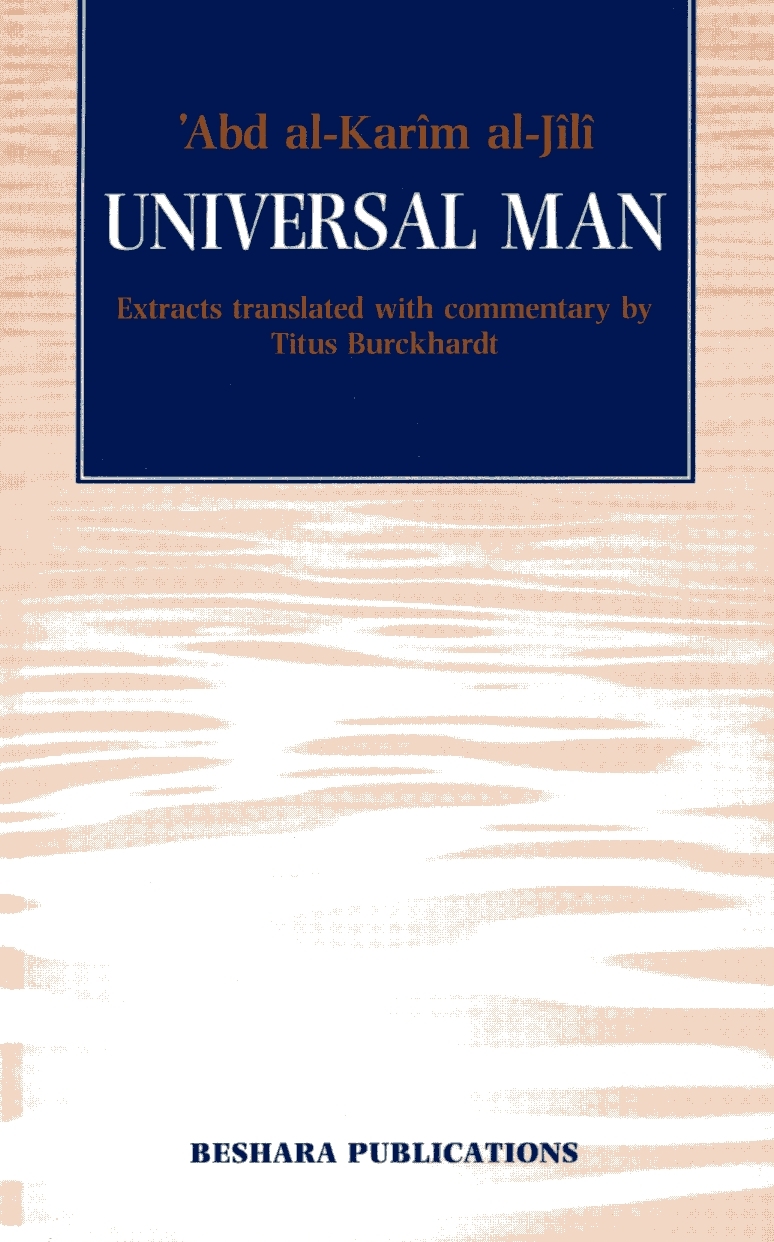BOOKS BY BESHARA PUBLICATIONS
Universal Man
By ‘Abd al-Karim al-Jili
Extracts, translated with commentary by Titus Burckhardt.
Translated from the French by Angela Culme-Seymour.
£ 7.50 (+P&P)
Paperback, 102 pages
How to Order
Worldwide
Please order with Beshara Publications [/]
email: info@besharapublications.org.uk
Credit/debit card: on receipt of your order a PayPal invoice will be sent by email. A Paypal account is not required.
Cheque: can only be accepted in GBP from UK bank accounts. Post to: Beshara Publications, PO Box 33, Northleach, Cheltenham GL54 3WU, UK
Postage will be added to your order.
How to Order
How to Order
Worldwide (except North America)
Please order with Beshara Publications [/]
email: info@besharapublications.org.uk
Credit/debit card: on receipt of your order a PayPal invoice will be sent by email. A Paypal account is not required.
Cheque: can only be accepted in GBP from UK bank accounts. Post to: Beshara Publications, PO Box 33, Northleach, Cheltenham GL54 3WU, UK
Postage will be added to your order.
.
North America
Please order direct from the Muhyiddin Ibn Arabi Society [/]
“I will mention of all that only that which happened to me on my own journey to God; moreover, I recount nothing in this book, neither of myself nor of another, without my having tested it at the time when I travelled in God by the path of intuition and direct vision.”
Universal Man is an exposition of the appearances of Absolute Being as Essence, Names, Qualities and Divinity, and of the corresponding contemplative states in the path of Union.
This is far from being merely a theoretical matter.
Read an Extract from the Book
Extract from Universal Man
From Chapter 1
Know that by ‘essence’ (adh-dhat) one means, in a general manner, that to which the Names (al-asma) and the Qualities (as-sifat) are attached by their principle (fi ‘ayniha), and not by their [contingent] existence (fi wujudihah). Every Name and every quality attaches itself to a subjacent reality which, itself, is its essence.
As for existence (al-wujud), it has two degrees; it is the pure Being, in so far as Essence of Creator (al-bari), or the existence attained by nothingness, in so far as the relative essence of creatures.
By ‘Essence of God’ (dhat Allah) – exalted may He be! one means God Himself, that is to say That by which He is; God subsists in fact by Himself, and it is to this Divine Aseity (al-Huwiyah) that the Names of [Perfection] and the [Universal] Qualities essentially belong. One conceives, then, the Essence through every form [of idea] which flows logically from one of the meanings which It implies; I mean that every Quality which results from one of His attributes really belongs to Him; it is to the Essence – to its Being – that every Name implying an idea of perfection (kamal) is connected; now, the sum of the perfections includes infinity and therefore the impossibility to embrace It by intelligence, from which there results, on the one hand, that It is unknowable, and on the other that even that may be known, since it is impossible to be ignorant of it.
Have I learnt all, globally and distinctly,
Of Thine Essence, O Thou, in whom all Qualities are united?
Or is Thy Face too sublime for Thy Nature to be grasped?
I understand then that His Essence cannot be understood.
Far be it from Thee that anyone may fathom Thee, and far be it from Thee
That anyone ignore Thee, – Oh perplexity!
Know that the Essence of God The Supreme is the mystery (ghayb) of the Unity (al-ahadiyah) which every symbol expresses in a certain respect, without it being able to express It under many other respects. One conceives It then not by some rational idea, any more than one understands It by some conventional allusion (isharah); for one understands a thing only by virtue of a relation, which assigns to it a position, or by a negation, hence by its contrary; but, there is not, in all existence, a single relation which ‘situates’ the Essence, nor a single assignation which applies to It, consequently nothing that can deny It and nothing which is contrary to It. It is, for language, as if It did not exist, and in this respect It refuses human understanding. He who speaks becomes dumb before the Divine Essence, and he who is agitated becomes immobile; he who sees is dazzled. It is too noble to be conceived by the intelligences. […] It is too elevated for thoughts to grasp It. Its primordial foundation (kunh) is attained by no sentence of the science, nor by any silence that stills it; no limit, however fine and incommensurable it may be, embraces It.
Abd al-Karim al-Jili
‘Abd al-Karim al-Jili (1306-1403) was born near Baghdad, a descendent of the great saint and founder of the Qadiri dervish order, ‘Abd al-Qadir al-Jilani. Little has been discovered about his life, save a few glimpses of spiritual autobiography revealed in his writings, but it is known that he travelled in India, and then lived for a time in the Yemen. He produced more than twenty books, of which Universal Man (al-Insan al-Kamil) is the most celebrated. His teaching follows that of Muhyiddin Ibn ‘Arabi, of which it can be regarded as a systematic exposition, though expressed in a manner which is uniquely his own.
© The Beshara Trust (UK) 2022. All rights reserved
